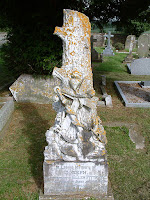 | |
| Everett Cooke (1927-1987) and Winifred Pittaway (1905-1937) |
 |
| Winnie and Dorothy with their mother Rose |
Castlegar, in the interior of British Columbia, was a newly minted settlement. The first schoolhouse and the first hotel had only been built in 1908. Census data shows that Arthur had established himself as a farmer by 1911.
 |
| Winnie and Alfred Cooke |
Arthur, Rose and Dorothy moved to the larger community of Trail, British Columbia where Rose died in 1934. Arthur remarried in 1940 and moved to Vancouver. I remember meeting him around 1965 when he was in his eighties. He died in 1970 and was buried beside Rose at the Mountain View Cemetery in Trail.
When I first started researching my Pittaway ancestors I had some difficulty discovering Arthur's origins. I knew that he had been born in England in 1878, and I knew from a note on the back of a blurry photograph that his mother's name was Margaret. The 1881 Census showed numerous Pittaway families in the West Midlands, but no Arthur and Margaret. Finally, I found several Pittaway families living in Watchet, Somerset, a harbour on the Bristol Channel.
 |
| Arthur Pittaway (1877-1970) |
Arthur's father, Joseph Snow Pittaway was born in Watchet in 1852, the son of Frederick Pittaway and Ellen Burge. His wife, Margaret Mock, had been born in Braunton, Devon. Margaret's brother Joseph Mock (1835-1868) had married Martha Pittaway (1834-1889), Joseph Snow Pittaway's aunt. It was likely through them that Joseph and Margaret met.
Joseph Snow Pittaway began his nautical career in 1863 as a boy on the ketch Tom. His uncle, Joseph Pittaway, was the master. In 1871, he was mate aboard the Thomas & Sarah. The following year he was mate on the schooner Kelso. He became master of the Fortitude in 1873, followed by the Ann in 1876, and the Kelso in 1877. Joseph was master of the Kelso for five years.
The Kelso was owned by the Beasley family of Watchet, and frequently carried iron ore from the Brendon Hills in West Somerset to Newport in Wales, and returning with a load of coal. A portrait of the Kelso hangs in the Watchet Market House Museum.
 |
| The Topsail Schooner Kelso by Thomas Chidgey (1855-1926) |
Joseph afterwards sailed trows on the Severn River estuary, frequently carrying salt from Gloucester to Bristol. A trow is a small vessel. The only surviving Severn trow, Spry, built in 1894 is just under 22 metres in length with a beam of 5 1/2 metres.
When regattas became popular in the late 19th century Joseph took up the sport of yachting. He almost drowned in 1905 when his yacht capsized during a race at Minehead.
In the 1914 Kelly's Directory, Joseph is listed as a Master Mariner, however, the 1911 census shows him as a worker at the Wansbrough Paper Mill.
Margaret died in 1910. Joseph died in 1927.
 |
| Watchet Harbour by Thomas Chidgey (1855-1926) |
Frederick was a mariner, however, he contracted measles in 1855 and became blind. The 1871 Census records Frederick Pittaway as a "late mariner" and "blind from measles." The 1861 Census indicates that he been blind for six years. His blindness, however, didn't stop him from getting in trouble with the law. An 1864 article from the Taunton Courier reported that Frederick, his brother Joseph, and several others were fined £2 each for assaulting a police constable. One the magistrates described the group as "a riotous bad lot of fellows." Frederick died in 1878.
 |
| Margaret Mock and the "Eldest of the family" |
 |
| Joseph Pittaway (1830-1904) |
Alfred Pittaway was the fourth child of James and Jane. He was living with his parents in 1841 but afterwards disappears from the records. Martha was the first daughter of James and Jane. Her husband Joseph Mock was mate on the schooner Trial when it sank with the loss of all hands during a heavy gale in the Bristol Channel.
James and Jane's fifth son, Robert, stayed away from the sea and became a coachman in Leckhampton, Gloucester. His sister Elizabeth died in infancy. James and Jane's youngest child, Wentworth Pittaway (1842-1899) emigrated to South Africa after spending several years in Port Glasgow, Renfrewshire, Scotland.
In his will James describes himself as a "Paper Maker" and bequeathed his estate to his daughter Martha, the widow of Joseph Mock.
According to census data, James was born in Cornwall about 1798. I have not be able to find a baptism for him, but there is a marriage recorded for James Pittaway of the Worcestershire Militia and Ann Snow of Penryn at St Gluvias on 25 Oct 1795. But there the Pittaway trail ends.
 |
| St Decuman's Church and Watchet Paper Mills by British School |
